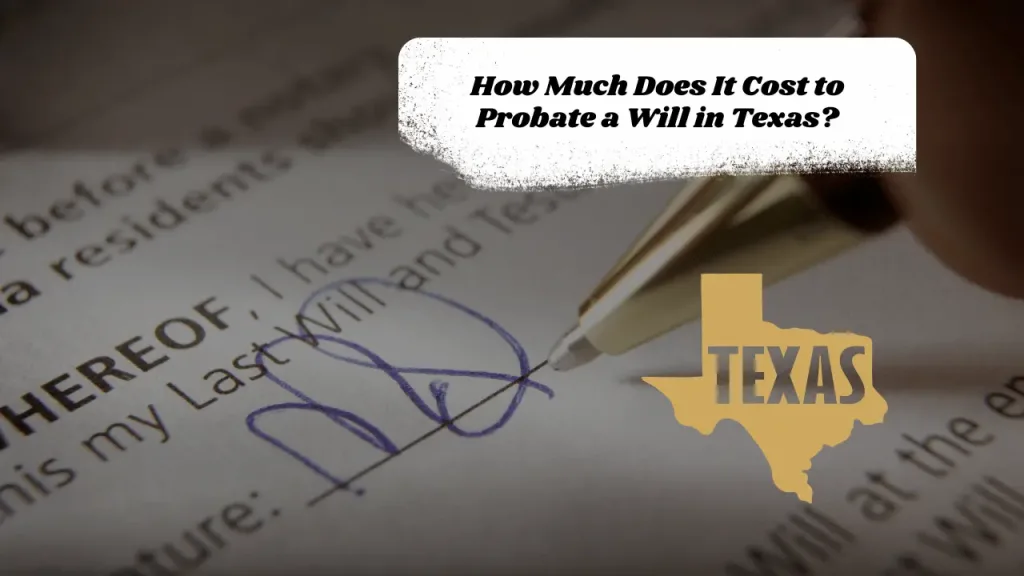How Much Does It Cost to Probate a Will in Texas?
The cost of probating a will in Texas can range from $3,000 to $50,000 or more, depending on the estate’s size and complexity. Below is a detailed breakdown of the potential expenses:
Key Probate Costs in Texas
1. Court and Filing Fees ($200–$500+)
These are the basic costs to file the will and initiate the probate process. Fees vary by county—urban areas like Austin or Dallas may have higher fees than smaller towns.
2. Attorney Fees (1–7% of Estate Value or $250–$500/hour)
Hiring a probate lawyer is often the largest expense. Attorneys typically charge:
- Hourly rates: $250–$500 for straightforward cases.
- Percentage-based fees: 1–7% of the estate’s total value. For example, probating a $500,000 estate could cost $5,000–$35,000 in legal fees.
3. Executor Fees (Up to 5% of Estate Value)
The executor (person managing the estate) is entitled to compensation, usually capped at 5% of the estate’s value. For a $300,000 estate, this could mean up to $15,000 in executor fees.
4. Appraisal and Inventory Fees ($500–$5,000+)
If the estate includes valuable assets like real estate, jewelry, or businesses, professional appraisals may be necessary, adding significant costs.
5. Bond Fees (1–3% of Estate Value)
Some courts require a surety bond to protect beneficiaries. The premium usually costs 1–3% of the estate’s value.
6. Other Costs
- Publication fees: $100–$200 to notify creditors.
- Certified copies & postage: $50–$200.
- Property maintenance: Costs to maintain homes, vehicles, or other assets during probate.
Related article for you:
What Happens If You Don’t Probate a Will in Texas? A Clear Guide
What Affects the Cost of Probate in Texas?
Several factors influence the final cost of probate:
1. Estate Size and Complexity
Larger estates with multiple properties, investments, or businesses require more legal work. For example, a $1 million estate could cost $10,000–$70,000 in probate fees.
2. Family Disputes
If heirs contest the will or argue over asset distribution, legal fees can increase dramatically. Contested cases may cost $10,000–$50,000 or more.
3. Location
Probate costs tend to be higher in large metro areas like Houston or San Antonio compared to rural counties.
4. Type of Probate
- Independent Administration: Less court involvement, costing $1,500–$5,000.
- Dependent Administration: Requires more court supervision, potentially doubling or tripling expenses.

How to Save Money on Probate in Texas
Here are some practical strategies to reduce probate expenses:
1. Set Up a Revocable Living Trust
Assets placed in a trust bypass probate, saving thousands. For instance, a $400,000 estate could avoid $8,000–$20,000 in probate costs.
2. Use Beneficiary Designations
List beneficiaries for life insurance, retirement accounts, and bank accounts using “Payable on Death” (POD) or “Transfer on Death” (TOD) designations to avoid probate.
3. Consider Small Estate Procedures
If the estate is worth $75,000 or less (excluding the homestead), you may qualify for a Small Estate Affidavit, which costs $300–$1,500, significantly less than full probate.
4. Choose an Efficient Executor
A well-organized executor can handle paperwork efficiently, reducing legal fees and delays.
FAQs About Texas Probate Costs
1. How Long Does Probate Take in Texas?
Probate usually takes 6 months to 2 years, depending on estate complexity and disputes.
2. Can You Avoid Probate in Texas?
Yes! Assets owned jointly, placed in trusts, or designated to beneficiaries avoid probate entirely.
3. Do You Need a Lawyer for Probate in Texas?
While not required, hiring a probate attorney is highly recommended—especially for larger or contested estates. Flat-fee services start at $1,500 for simple cases.
Need Help with Texas Probate?
If you’re feeling overwhelmed, these resources can help:
- TexasLawHelp.org – Free legal information and forms.
- Bryan Fagan Law Firm – Probate Cost Guide.
- ClearEstate – Probate Services.
Final Thoughts
Understanding the cost of probate in Texas is the first step in managing the process effectively. By planning ahead—using trusts, beneficiary designations, or small estate procedures—you can save time, money, and stress.
If you’re unsure where to start, consult a probate attorney or use online resources to guide you. Probate doesn’t have to be overwhelming—with the right knowledge and tools, you can navigate it smoothly and protect your family’s future.
About the Author

Sarah Klein, JD, is an experienced estate planning attorney who has helped clients with wills, trusts, powers of attorney, and probate matters. At All About Lawyer, she simplifies complex estate laws so families can protect their assets, plan ahead, and avoid legal headaches during life’s most sensitive moments.
Read more about Sarah
